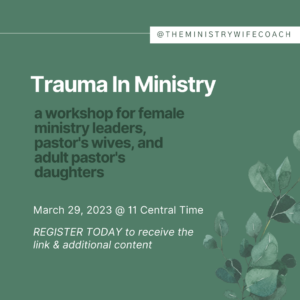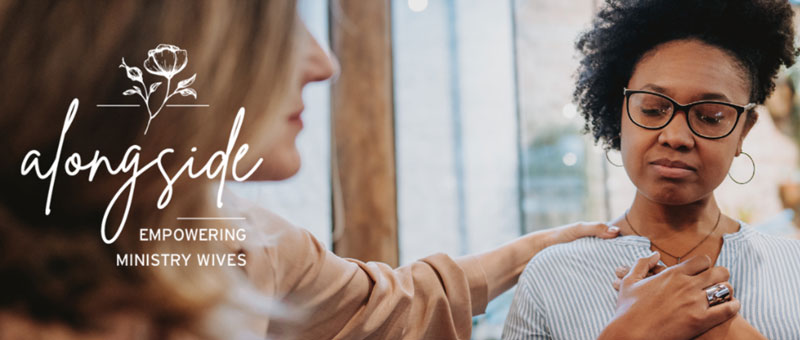We were pulling onto the interstate when I saw a voicemail come in on my phone. Craig and I try not to answer calls when we are on a date, so I’d let it go to voicemail. But something inside was telling me this was important – so I listened. I could hear my friend on the other end, stifling a sob and struggling to get the words out, “Can you just please call me…?” After taking a big breath, I said to Craig, “I don’t know why I know this, but she’s calling to tell me that ‘Joe’ is having an affair and her life is falling apart.” Craig looked at me with disbelief. We’ve been friends with these people for too long. Surely we wouldn’t have missed this.
After calling her back, she confirmed exactly what I’d sensed. And Craig and I were both dumbfounded. This was the first, but definitely not the last, time we’d have to walk with a couple through the devastation that comes with one of them deciding to be unfaithful to their marriage vows, through sexual or emotional infidelity. For the next few months, we’d scramble to try to figure out how to help this family survive and begin to think about healing. I would homeschool her kids, bring them meals, clean her house and try to help her navigate this anger that a “good Christian woman” shouldn’t feel.
There was so much I didn’t know. There’s still a lot I don’t know. But I’ve had to figure some of it out. And it’s made me dig in because I’ve had to do it again (and again) and I want to do good – not damage.
I’m going to get to some of the nuggets that I’ve learned, but first we need to call something out. I would bet that if you are reading this, you’ve been here before. The likelihood of a pastor’s or ministry wife being the one that a hurting wife goes to when she uncovers this devastating news is really high. Our congregations trust us. We’re safe. We represent a God that (they’ve heard, but might not believe) loves them. And they assume we’ve had some kind of training to help them through this whole mess. But guess what, most of us haven’t. The second thing I want to call out is the obvious use of the pronouns “her” and “she”. Of course wives have affairs, but I’m assuming that most husbands won’t seek out a pastor’s wife to walk with them through this. A resource for men is a task for someone else. But no matter which one did the stumbling, when we find ourselves in this place of helping pick up the pieces, it can be overwhelming.
But that doesn’t mean we should shy away from showing up to this kind of pain. We might not have all of the answers (and pointing them to a professional that can offer some tools that we don’t have is wise). But in the moment of crisis, don’t underestimate the power of your presence. Just knowing that you are willing to feel some of the pain with her is a powerful force against a desperate and crushing isolation that is pushing in on her.
But how can I “be in it” without it consuming me? It’s such a deep well of pain – how can I touch it without slipping into that abyss?
A question I wrestle with each time I enter into crisis with someone.
Here are some things I’ve learned (through hard knocks but also by consulting with people with more training and experience than I).
THREE THINGS TO KEEP IN MIND:
MANAGING MY OWN HEART
Tip #1 – Recognize the high emotional cost of entering into pain with others. Create space to process the emotions and experiences.
Practicals:
- Designate someone safe that you can talk through your own experience with. This might be your husband, a counselor or mentor. Verbally articulate that this is a crisis and ask them if they are up for being “the person” that you process with. You might even outline what that means, what you need and what you don’t (Empathy? Suggestions? Safety?). It’s ideal when this is your husband, because he likely already knows what’s happening. But sometimes someone outside of your marriage team is needed. Just realize that keeping her confidentiality will be trickier. Whenever you feel the need to seek outside wisdom or if you need support, always ask her permission. Whoever you process with, using “I” statements and avoiding using names are good bumpers. And of course, sharing her story with others in your congregation or community, even just to ask for prayer, is damaging and can work against her healing (plus, it’s sin.)
- Clear non-essentials from your schedule. Postpone non-crisis appointments.
- Protect your time with Jesus and allow Him to meet you in different ways.
- Release yourself from the pressure to “show up” as normal to all of your typical commitments. Maybe greeting after services isn’t essential right now.
TIP #2 – Surrender them to Jesus
Practicals:
After each time with the person, intentionally surrender them to Jesus and invite Him to be their Healer. You can’t shoulder the weight of their pain yourself. I have to do this out loud. (More on this in our upcoming Alongside podcast episode “Walking with People in Pain- without being consumed yourself”)
WALKING WITH HER
TIP #3 – Allow space for anger.
It may scare you, but you need to be able to hold on through it. The anger may not get the final say, but it needs to have a voice. When this anger is squelched and not given a voice, it festers and is not able to go through the process of healing. We often want to speed to forgiveness, just to get it over with. But doing this will mean incomplete healing, and infection. (More about this in the upcoming Alongside podcast episode “Walking With People Through Infidelity)
Practicals:
- Resist judgement. There might be a part of you that might think “did she contribute to this?” or “it takes two to tango” or “maybe if she weren’t so controlling, he wouldn’t have…” There are always reasons for disfunctions, but reasons are different from excuses. There is never an excuse for abuse or cheating in a marriage.
- Encourage full disclosure. She will have a season of living in fear that she doesn’t know the whole story. We don’t want her to stay in that season for longer than necessary. Encourage them to seek out a professional counselor, with experience in infidelity, that can walk with them through a disclosure (this is the process of the offending person writing down all of the details, events, duration, partners, etc and sharing that). It sounds really cruel, but nothing healthy grows in the dark. So getting it all out into the light is the only way to deal with it and move forward.
This is just a start, but hopefully a helpful one. As with any grief process, your presence in her pain can be used by God to combat the isolation and despair that she may be feeling. You can’t fix it. You can’t even make it feel better. But you can be a reminder of God’s closeness in the midst of the deepest valley she’s likely ever walked, or will ever walk through. But, she will walk through.
______________________________________________________________________
OTHER RESOURCES:
THE ALONGSIDE PODCAST
The soon-to-launch Alongside Podcast is going to tackle some tough questions, just like these. Here are some of the upcoming episodes in Season 1, so you can watch for them:
-
The Importance of Practicing Vulnerability and Wisdom as a Pastor’s Wife
-
How to Walk with People in Pain-without being consumed yourself
(Interview with counselor that works specifically with people in ministry)
-
Walking Through Infidelity with Others as a Pastor’s Wife
-
When Your Husband is Unfaithful – and He’s Your Pastor
(Interview with trauma counselor that deals specifically with betrayal healing)
**Alongside Podcast launches Wednesday, April 5! Watch your Inbox for a reminder.
THE MINISTRY WIFE COACH – MINISTRY TRAUMA
Are you struggling with stress, anxiety, and pain that ministry life can bring? Does your heart feel fragile or beyond it’s capacity to take even one more thing? Maybe you’ve noticed some wounds caused by betrayal, criticism or just trying to carry other people’s pain.
Come join us and learn why these common ministry wounds impact your body, mind, and spirit and how elements of trauma are interwoven with ministry life. You’ll learn new ways to begin to heal and walk in greater health while navigating the life you’re in so you can stop looking to escape it! Whether looking for greater understanding or camaraderie in the journey, this workshop will help you gain compassion for where you are, help you know you truly are not alone, and offer practical tools you can implement so you can walk toward healing.




